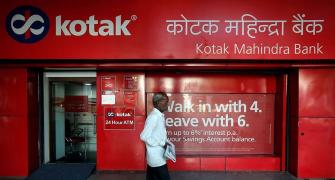 In the past three weeks, early-stage venture capital firm Matrix Partners has invested in three start-ups.
In the past three weeks, early-stage venture capital firm Matrix Partners has invested in three start-ups.
In an interview, Avnish Bajaj, managing partner, Matrix Partners explains to Ranju Sarkar why his firm is bullish on e-commerce.
Bajaj says although valuations are getting frothy, the story is driven much more by fundamentals, and India could see the emergence of 30-40 billion-dollar e-commerce companies in the next five years. Excerpts:
You announced three deals in 3 weeks. What explains that?
The announcements typically trail the investments. For the past one year and a half, our investment pace has been higher. We used to do 6-8 deals in a year; now we are tracking 10-12 deals. It is largely driven by the opportunities.
Our strong view is that there's a once-in-a-lifetime confluence of three or four factors, which has made investment very attractive.
We have seen the market deepen. To have a critical mass, there has to be at least 20 million daily active users on the internet. That's when a number of business models that were not attractive earlier start becoming attractive.
That happened in 2011. Then the second inflection happened in mid-2012, when the mobile internet users exceeded desktop internet users. There was an e-commerce bubble between 2010 and 2012, which we consciously did not participate because we felt the valuations were running ahead of their time.
Call it part serendipity and part luck, we turned aggressive right around the time when people turned conservative (between 2012 and early 2014 when all series-B rounds were frozen and e-commerce saw consolidation).
Were the valuations not cheaper earlier, say, in 2010-2011?
Most people who invested between 2010 and 2012 have lost their money. It's not about valuations.
Those business models did not make sense and there was not a deep a market to do it. In 2014, the valuations are getting frothy, but the growth rates of some of these companies are mind-blowing.
They are growing 5-10 times, year-over-year. My definition of a bubble is that when the valuations are completely out of sync with the fundamentals, and probably order of magnitude ahead of fundamentals.
So, clearly 1999-2000 was a bubble, 2007 was a bubble, and the period between 2010 to 2012 was a bubble, too. I believe the current valuations are frothy and high, and, maybe, the companies are getting valued one or two rounds ahead.
I mean, what they are getting in Series-B round of funding, is what they should be getting in Series-C. Companies are getting valued at two or three times of what they should be valued at.
They are not getting valued at 10-50 times, which to me is a bubble. Even if you assume a company is valued at two or three times of what it should be, in a year it actually grows and exceeds that valuation.
We are betting on the fact that the market has deepened, and unlike in the bubble year, companies are not growing by giving money away. Yes, in some cases, the burn is increasing.
But in a lot of cases, we are seeing this kind of growth without increasing the burn, which is a really healthy indicator of a solid business model. To me, this boom is real; it is much more fundamentals-driven, but yes, valuations are getting a little frothy. I have never seen this quality of entrepreneurs in my life in India.
You spoke about the confluence of three or four factors. We spoke about the market deepening, what are the others?
First of all, you have entrepreneurs who are in it for the long-term, and they are looking to create large companies, and not looking to exit. The market has deepened and people are shopping a lot more.
People may discount, but they are focused on their contribution margin, they are looking at the lifetime value of customers and customer acquisition costs. So, the business models are much more robust.
Given the funding environment, people have a long-term view of the market to let it grow and to make it very large. People are recognising how big this can be.
It you look at China, all the metrics, whether it is internet or mobile, they look remarkably similar to what India looked like now or 6-12 months earlier.
In the past seven years, 70-80 billion-dollar companies have been created in China. India is a smaller market, but at least 30-40 such companies should happen here in the next five years.
Is there a change in the way you evaluate start-ups? Or, are you willing to invest at an earlier stage?
We evaluate exactly the same way, except that we are willing to invest at an earlier stage today.
If the founders figure out the right product-market fit in our lingo, the business is going to take-off very quickly. Unlike in the past, it could take one-two-three years for the business to take off and we could come in at any time, we believe now things will take off very faster. We should get in early. Once it takes off, it will become expensive for us.
At what stage of the company would you like to get in today vis-à-vis you got in earlier?
If you define the various stages in a start-up, there's a concept stage, then founding team fully in place, the third phase would be minimum viable product or MVP, the fourth would be initial traction (it's never revenues, just traction on metrics), and the next would be scaling, monetisation and profitability.
We have played in almost all. If you look at Limeroad.com, we invested in her at the concept stage, she did not even have a founding team.
Normally, we would invest at the traction stage - there's a team, there's some product, and there's some initial traction.
We don't worry about monetisation and scaling. We are now willing to go back to concept-plus-team stage. If the team is not complete, then we don't take the risk.
Is this driven by the fact that valuations are getting expensive, and you need to get in early?
Earlier, concept to scaling would be two-to-three years. That would give us plenty of time to get in. Now, when the market has arrived and it is deep, that phase could be six months.
So, it is driven by how quickly adoption can happen.
Yes, if it takes off in six months, things will get hyper-competitive, pricing will go haywire, and we might not be able to win the deal beyond a point. Our DNA is to work very closely with the company.










